Cloud computing has become incredibly important in the IT industry. It’s changing how businesses handle their data and software, making operations more efficient and flexible. As more companies move to the cloud, there’s a growing need for people who understand its basics.
Learning about cloud computing basics isn’t just helpful—it’s essential for anyone looking to build a career in IT today. It offers new ways to manage technology that are more scalable and cost-effective than traditional methods. Whether you’re starting out or already working in IT, understanding these basics can greatly boost your skills and make you more attractive to employers.
In this blog, we’ll explore why knowing the basics of cloud computing is so important for advancing your IT career. We’ll cover everything from the basics themselves to how they’re used in real-world jobs. By the end, you’ll see how mastering these fundamentals can open up new opportunities and keep your career on track in the fast-changing world of technology.
Understanding Cloud Computing Basics: The Foundation of Modern IT
Cloud computing is like renting computing power and services over the internet instead of owning them yourself. It’s vital because it allows businesses to use and manage their IT resources more flexibly and cost-effectively.
An explanation of what cloud computing is and why it’s vital:
Cloud computing lets businesses access and use a wide range of services, like servers, storage, and software, without needing to own and maintain physical hardware. This flexibility is crucial for adapting to changing needs and growing quickly. Plus, companies only pay for what they use, which can save money.
An overview of key concepts and terms related to cloud computing basics:
- Infrastructure as a Service (IaaS): renting virtual machines, storage, and networking over the internet.
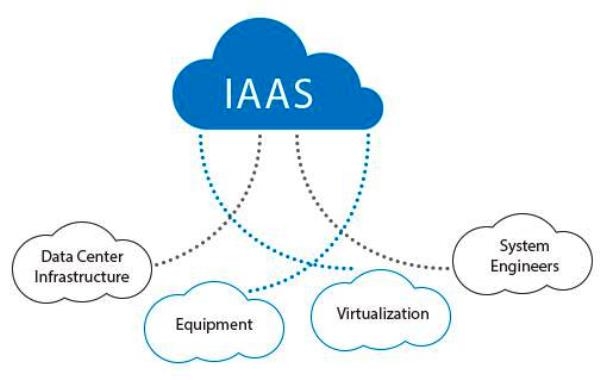
- Platform as a Service (PaaS): Tools that help developers create, launch, and handle apps without needing to manage the technical details underneath.
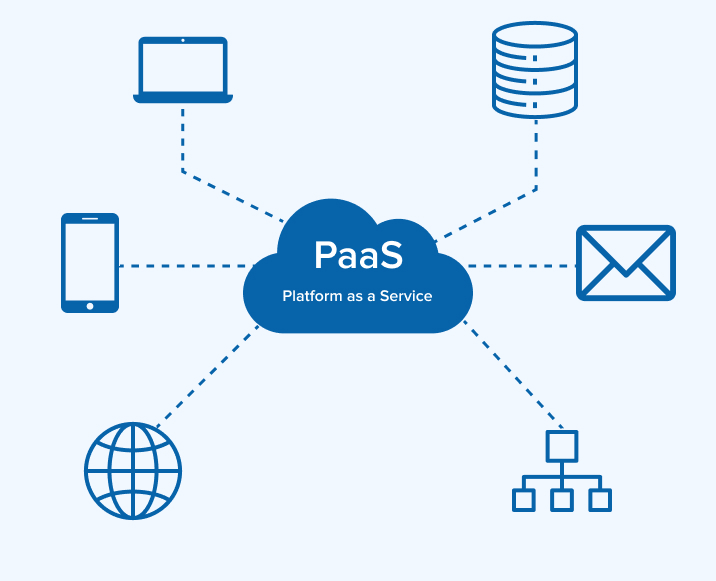
- Software as a Service (SaaS): Access software applications over the internet, like email or office tools.

- Public Cloud: Services from companies like AWS or Microsoft Azure are available to many users over the Internet.
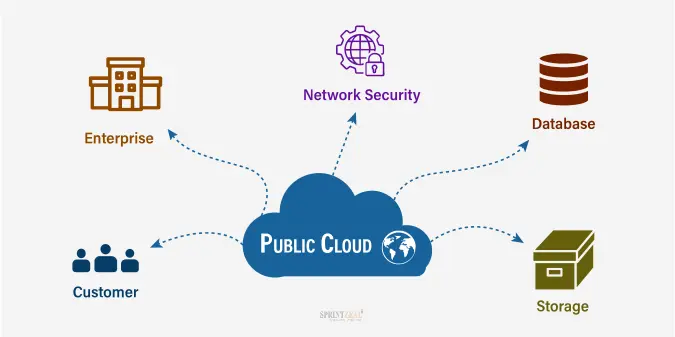
- Private Cloud: Cloud services are used only within one organization, giving more control over security and data.
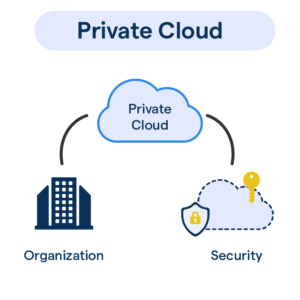
- Hybrid Cloud: Mixing public and private cloud services for flexibility.
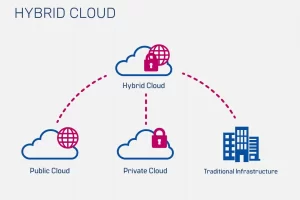
Knowing these basics helps IT professionals use cloud computing more effectively, making businesses quicker and more efficient.
The Demand for Cloud Computing Skills in the IT Job Market
As businesses increasingly move their operations to the cloud, the need for professionals with cloud computing skills is growing rapidly.
Statistics and trends showing the increasing demand for cloud computing skills:
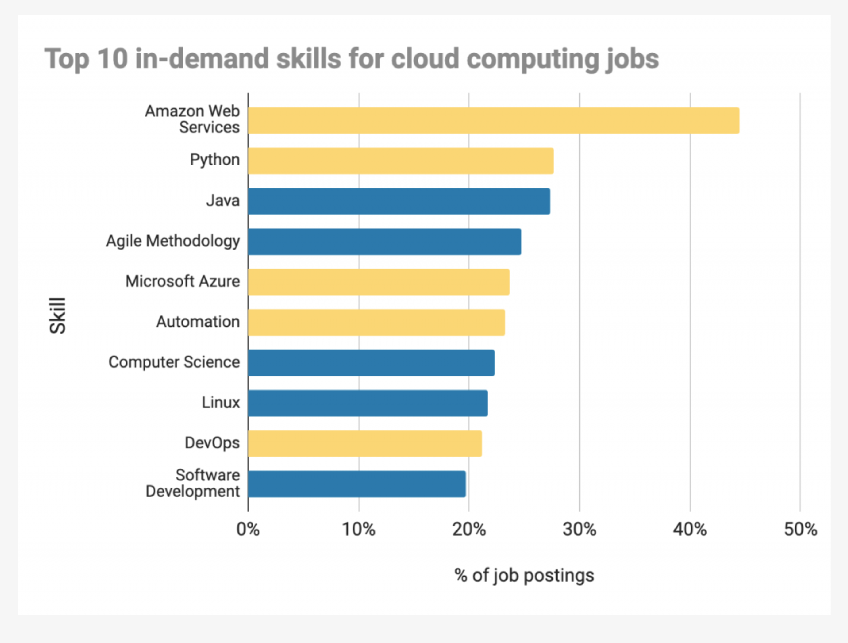
Job Market Growth: The global cloud services market is expected to grow by 21.7% in 2023, reaching $591.8 billion. This growth drives the demand for cloud computing professionals.
Top Skill Needed: LinkedIn’s 2023 Workforce Report lists cloud computing as one of the top ten hard skills needed by companies. There’s a noticeable gap, showing the high demand for these skills.
Spending Increase: By 2025, nearly 60% of IT infrastructure spending will be on cloud-based solutions, highlighting the need for professionals with cloud computing skills.
Job Postings: Job postings requiring cloud computing skills have grown by 27% annually over the past decade, indicating increasing reliance on cloud technologies.
Higher Salaries: Cloud computing professionals earn high salaries. For example, cloud engineers in the U.S. earn around $121,000 per year on average.
Companies across various industries are adopting cloud solutions at a rapid pace. For example, recent studies show that over 80% of businesses use or plan to use cloud services. This trend is driving an increase in demand for IT professionals who understand cloud computing.
Types of IT roles that require knowledge of cloud computing basics:
Designs and implements cloud infrastructure solutions, requiring knowledge of cloud architecture and services.
Cloud Engineer: Builds and maintains cloud environments, working with platforms like AWS, Azure, and Google Cloud.
DevOps Engineer: Enhances efficiency in deploying and managing applications in the cloud, needing skills in cloud platforms and automation tools.
Systems Administrator: Manages IT infrastructure, often handling cloud-based servers, storage, and networking.
Cloud Security Specialist: Protects cloud environments from cyber threats, requiring knowledge of cloud security practices.
Data Engineer: Designs and manages data pipelines using cloud-based solutions, working with services like Amazon Redshift and Google BigQuery.
Software Developer: Develops applications for cloud platforms, needing knowledge of cloud-native development and containerization.
IT Project Manager: Oversees cloud adoption or migration projects, benefiting from understanding cloud computing basics.
The demand for cloud computing skills in the IT job market is growing rapidly. Knowledge of cloud computing basics is essential for various IT roles and can significantly enhance job prospects and earning potential. Whether starting or advancing in your career, acquiring cloud computing skills is a valuable investment.
The Basics of Cloud Computing: Enhancing Your Technical Skills

Learning the basics of cloud computing can boost your existing IT skills and create new opportunities in technology.
Adding cloud computing basics to your existing IT skills:
Understanding cloud computing helps you manage IT resources better. It works well with what you already know, offering new ways to solve problems and innovate at work.
Examples of technical skills improved by cloud computing knowledge:
- Networking: Cloud platforms have tools for setting up and improving networks, making connections faster and more reliable.
- Security: Knowing cloud security helps protect data and apps stored online, keeping them safe from hackers and other risks.
- Data Management: Cloud services provide scalable storage and tools for analyzing large amounts of data efficiently.
By mastering the cloud computing basics, you can improve your skills in these areas and become more valuable in IT roles.
Certification and Training: Mastering Cloud Computing basics
Getting certified in cloud computing basics can boost your career prospects in IT. Here are some popular certifications and recommended online courses:

Popular certifications that focus on cloud computing basics :
AWS Certified Cloud Practitioner: A beginner-level certification by Amazon Web Services (AWS) covering cloud concepts, AWS services, security, and architecture.
Microsoft Azure Fundamentals: An introductory certification from Microsoft Azure, focusing on core Azure services, pricing, SLA, and support.
Recommendations for online courses and training resources:
Coursera offers courses like “Cloud Computing Foundations” by Google Cloud, covering fundamentals and practical applications.
Udemy provides courses such as “Introduction to Cloud Computing with AWS” for hands-on learning.
LinkedIn Learning features courses on “Cloud Computing Careers and Certifications” to guide you through certification paths.
These certifications and courses equip you with the essential knowledge needed to succeed in cloud computing roles, enhancing your skills and credibility in the industry.
Real-world applications of cloud computing principles in IT careers
Understanding cloud computing basics can lead to significant career advancements in IT. Here are examples of how it’s applied:
Case studies or examples of IT professionals benefiting from cloud computing knowledge:
John, Cloud Support Engineer: Improved troubleshooting and efficiency in resolving issues with cloud-based applications, leading to recognition and promotion.
Sarah, Cloud Architect: Designed scalable and cost-effective cloud infrastructures for multiple projects, demonstrating expertise and leadership in cloud technologies.
Practical applications in various IT roles:
Cloud Support Engineer: Manages and troubleshoots issues in cloud environments, ensuring smooth operation of cloud services for clients.
Cloud Architect: Designs and implements cloud solutions tailored to business needs, optimizing performance, scalability, and cost-efficiency.
DevOps Engineer: Automates implementation and management of applications in cloud environments, improving efficiency and collaboration across teams.
By applying cloud computing effectively, IT professionals can achieve career growth and contribute strategically to their organizations’ technology strategies.
Networking and Professional Growth Through Cloud Computing Principles
Understanding cloud computing basics not only improves your IT skills but also helps you connect with other professionals and grow in your career.
How understanding cloud computing basics can help you network with other IT professionals:
Understanding cloud computing basics is a gateway to networking within the IT community. It provides a foundational understanding that allows you to engage in meaningful discussions and collaborations with colleagues. By grasping key concepts like scalability, virtualization, and different service models, you can connect with professionals across various aspects of cloud computing. This networking can lead to shared learning, career advice, and potential job opportunities.
Opportunities for professional growth:

Attending Cloud Computing Conferences: Events such as AWS re
, Google Cloud Next and Microsoft Ignite offer invaluable opportunities to deepen your knowledge and expand your network. These conferences feature sessions by industry experts, hands-on labs, and networking events where you can meet professionals from diverse backgrounds and exchange ideas.
Joining Online Communities: Platforms like LinkedIn groups, Reddit communities, and specialized forums provide continuous learning and networking opportunities. Engaging in these communities allows you to stay updated on industry trends, ask questions, share insights, and connect with professionals globally who share your interests in cloud computing.
Future-Proofing Your Career: The Long-Term Benefits of Cloud Computing
Understanding cloud computing basics is essential for keeping your IT career secure over time. Here’s why it matters:
The future of cloud computing and its impact on the IT industry:
Continued Growth: The cloud services market is expanding rapidly as businesses adopt cloud solutions for their scalability, cost savings, and flexibility.
Emerging Technologies Integration: Cloud computing is essential for AI, machine learning, IoT, and big data analytics. These technologies depend on the cloud for processing power and storage.
Hybrid and Multi-Cloud Environments: More companies are using hybrid and multi-cloud strategies to optimize performance and security, requiring IT professionals to manage these complex environments.
Increased Focus on Security: With rising concerns about data privacy and security, there will be a greater significance on cloud security. Professionals with cloud security skills will be in high demand.
Support for Remote Work: Cloud computing enables remote access to resources and collaboration tools, making it crucial for supporting a distributed workforce.
Why knowing the basics of cloud computing keeps your career secure in the long run:

Flexibility: Cloud computing skills are applicable across various IT roles, improving job mobility and opening up various career paths.
Competitive Edge: Keeping up with cloud computing skills ensures you remain competitive. Employers seek professionals who can use cloud technologies for innovation and efficiency.
Higher Earning Potential: Professionals with cloud computing expertise often earn higher salaries. Keeping your skills up-to-date can lead to better compensation and career advancement.
Job Security: As industries increasingly depend on cloud technologies, professionals with cloud skills are less likely to face job disuse. Continuous learning ensures long-term job security.
Adaptability: The cloud computing field is dynamic, with frequent updates and new services. Staying updated demonstrates adaptability and a commitment to lifelong learning, making you a valuable asset to any organization.
Mastering cloud computing basics is a smart move for future-proofing your IT career. As cloud technologies continue to grow and integrate with emerging technologies, staying informed and skilled in cloud computing will ensure long-term career security, higher earning potential, and a competitive edge. Embrace continuous learning and adaptability to grow in the future of cloud computing and IT.
Conclusion
Understanding cloud computing basics is essential for IT professionals. It opens up various career opportunities and is in high demand due to the widespread adoption of cloud technologies. These skills can lead to better job prospects, higher salaries, and more job security.
Learning cloud computing basics is a smart investment for your career. There are many resources available, like online courses and certifications, to help you get started. Gaining these skills will make you a valuable asset to any company and keep you competitive in the IT field.
The future of IT is closely tied to cloud computing. As more businesses move to the cloud, the demand for skilled cloud professionals will grow. By learning cloud computing basics now, you can stay ahead in your career and be ready for the exciting opportunities the future holds. Embrace cloud computing, and you’ll be well-equipped for success in the evolving IT landscape.




